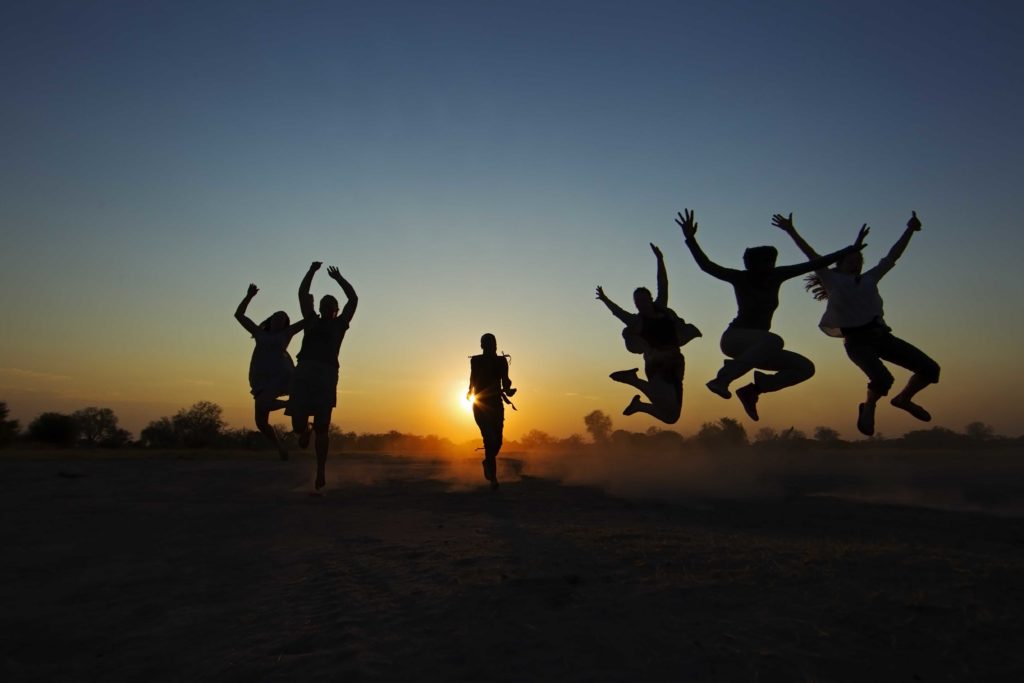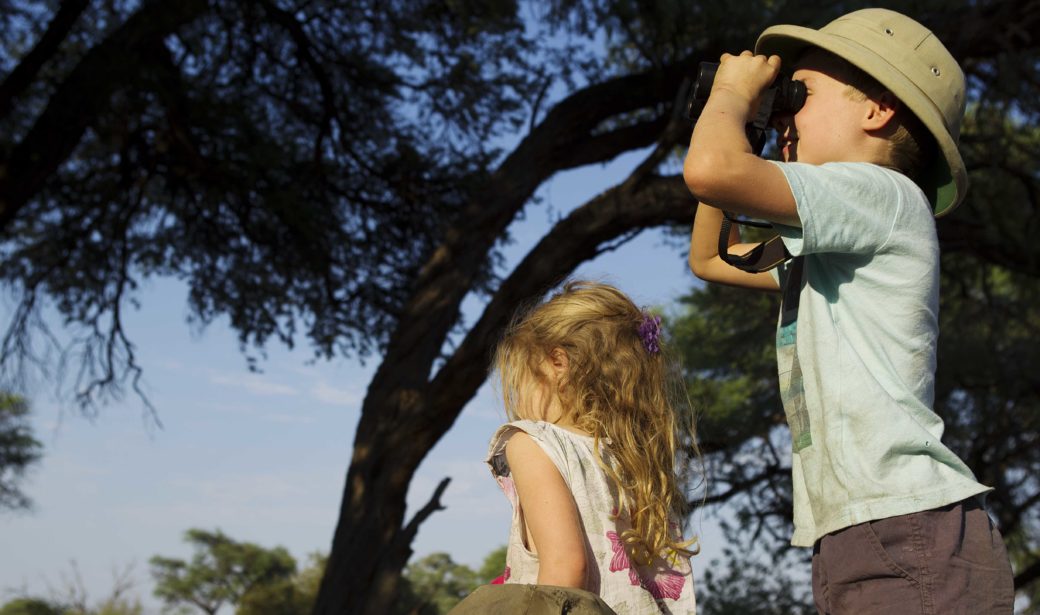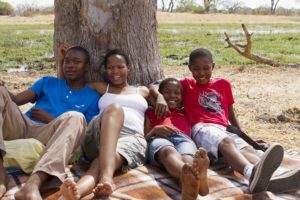All you need to know about family safaris in Botswana, what it will cost, where to go and how to make the most of your adventure!
WHAT IT WILL COST
This is always the biggie: we know that money doesn’t grow on acacia trees…
When planning your family safari, please bear in mind:
- We tailor-make each and every single one of our family safaris to suit our clients’ budgets, figuring out where to splurge and where to save, what deals are around and which camps offer the best value for money. Because we’re based here and have visited lots of lodges with our own children, we give you down-to-earth, realistic advice and quotations on family safaris in Botswana.
- This will be a vacation to remember. It’s an investment in broadening your children’s horizons and seeing things you simply can’t at home. Safaris are FUN!
- The reason our family safari ideas don’t have indicative rates is because there are so many variables attached to safaris with children that we cost them all individually, however our consultants can give you an idea of price ranges.
- Camps that do accept all ages often stipulate that you have a private game-drive vehicle (ie you don’t share with other guests). This is because they recognize that game drives are unpredictable: guests who might be happy to spend three hours patiently tracking a leopard have very different needs to a family with a restless 7-year-old who is tired and hungry! Having your own vehicle is pricier but far more convenient as you can have a flexible schedule – you can get off to a slower start (or earlier if you have early birds) and shorter game drives to be back in camp to hit the pool! There are exceptions as some camps are specifically family-orientated camps.
- Rates vary hugely over the seasons – it may be far more affordable to come on a family safari during Shoulder Season (that time between high and low season) or in Green Season (low season).
- Keep it simple. It’s tempting, if you’re coming all the way, to try and see as much as possible, but moving around too often can be time consuming, tiring and can really add up in price. Chat to us about seeing different landscapes and having diverse experiences while being smart about transfers on your family safari.
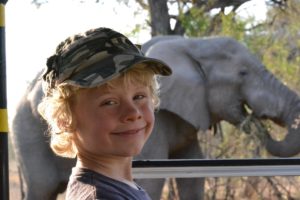
WHERE YOU CAN STAY
The question is not only what accommodation suits your family safari but also which safari areas to visit. Safari accommodation is usually quite different from a hotel and needs to be selected to suit your children’s ages and interests so that your family can make the most of this special experience. It’s going to seem like there are lots of ‘rules’ but luckily we know them inside out!
- Not all properties or safari operators accept children. Many safari camps and high-end lodges don’t take children under 12 years of age and some activities can be restricted for children – such as no walking safaris for under 16 years, no mokoro activities for under 12 years and a requirement for private vehicle for certain age children.
- Only a small selection of camps accepts children under six years of age. The reasoning behind not accepting very young children is not so much about safety but about the impact of younger children on other guests. Booking an entire camp out privately is one option (albeit a tad on the expensive side), so instead we have a small collection of camps to suit families with younger children.
- Most places are unfenced. The safari camps in Botswana, Zambia and Zimbabwe in particular are generally open for wildlife to wander freely through the grounds. Should this be a little too ‘wild’ for your liking, we have some ‘softer’ options, particularly in South Africa and Namibia.
- There are limited family units. Family safari accommodation usually comprises of two connected tents or suites that can take four guests, generally in a double bed (for parents) and twins (for the kids). Sometimes a third bed can be added if you have three children. Very few lodges have more than one family unit so it’s best to book around 9 – 12 months in advance of travel, especially if you want to visit over high season (July to October) to ensure you get what you’re after. Alternatively, for a more flexible and cost-effective option, there are hotel and guesthouses in close proximity to national parks and game reserves – like in the Kasane-Chobe River area of Botswana, and the Greater Kruger region in South Africa.
- Consider a villa! Safari villas are often the solution if you’re travelling with multiple youngsters, a few of their friends and a grandparent or two. They are generally set apart from the main lodge (so other guests aren’t disturbed by youngsters’ shenanigans), and often have private kitchens and swimming pools so you can feel right at home. The multiple en-suite bedrooms also help a lot if a group of different generations is travelling together. Your chef and butler will sort out everything like menus, mealtimes, game drives and other activities so you can adjust things to suit your kids’ energy levels.
BEST PLACES FOR SAFARI WITH KIDS
There are so many factors to take into consideration here but we will start with listing by age group and after that you really need to talk to one our consultants to figure out what is best for your family safari.
Younger Children (aged 2-6 years)
You can take younger children to most places in the Chobe River area in Botswana as most accommodation is outside the national park and you have daily activities into the park. This is your safest bet in Botswana. In Kasane and Kazugunla town we recommend The Old House, Chobe Bakwena and Chobe River Lodge. If you prefer larger hotel s then go for Chobe Bush or Chobe Safari Lodge.
For more of a bush feel, consider Chobe Elephant Camp and Tlouwana Camp. Not only do these properties both have family accommodation, they also take young children and allow them on activities (charge a private activity fee).
The Okavango and Linyanti-Savute areas get a little trickier. Many camps in the Khwai area of the Delta accept younger children including Sango, Machaba, Khwai Guesthouse (two new family units with 2 bedrooms with ensuite each), Khwai Bush Camp and Khwai Leadwood (the latest addition to the Khwai offering with beautiful family units). In the Linyanti and Savute we have Linyanti Ebony Camp, Ghoha Hills and Nogatsaa that welcome children over two years old. Other opportunities are available if you book sole use of camp, which can be pretty expensive but worth it if you are a large group.
The semi-desert camps in the Kalahari area and Makgadikgadi/Nxai Pan National Parks are great for families, with camps like Planet Baobab and Boteti River Lodge offering an affordable experience for all ages.
The Victoria Falls area on both the Zimbabwean and Zambian sides is perfect for family travel with so much to do for all ages. There is a wide range of hotels, guesthouses and camps that pretty much all take children of all ages and it is just a matter of location, how much you would like to spend and which inclusions you prefer. Special mentions with family units include Victoria Falls River Lodge, The Old Drift, Chundu Island on the Zimbabwe side and Waterberry Farmhouse and Chundukwa Cottage on the Zambian side.
The Hwange area in Zimbabwe has many options for younger children including Somalisa, Deteema, Bumbusi and Tom’s Little Hide and the Private Hide inside the park.
South Luangwa has a range of camps in the Mfuwe area that accept children of all ages, such as Flat Dogs, Track and Trail, Mfuwe Lodge, and Robin’s House. Activities will be moderated depending on children’s ages, particularly no guided walks will be permitted.
The greater Kruger private reserves in neighbouring South Africa have a number of options like the more affordable Gomo Gomo, Lukumbi and Elephant Plains. A little more upscale, we have Sabi Sabi Bush Lodge, Kapama Karula, Southern and River Camps and a collection of private villas from luxury operators.
Older children (6-12 years)
In addition to the above options that take children of all ages, being over six years of age opens up an additional range of safari camps – many of which are featured on our family-friendly camp listing.
A short list of camps with family rooms accepting children from about six or seven years, in addition to the aforementioned camps, are:
Okavango/Moremi – Young Explorers, Kanana, Okuti, Camp Moremi, Pom Pom, Mma and Rra Dinare, Setari, Sable Alley, Splash, Chitabe Lediba, Seba, Gomoti Plains and Private, Mapula, Little Vumbura and Tubu Tree
Linyanti/Savute – Lagoon, Lebala and Duma Tau
Kalahari, Makgadikgadi and Nxai Pan – Camp Kalahari, Deception Valley Lodge, Dinaka, Kalahari Plains, Tau Pan, Nxai Pan and Meno A Kwena
Hwange – Somalisa Acacia, Verney’s Camp, Deteema, Davison’s and Little Makololo
Mana Pools – Kanga Camp and Ruckomechi
South Luangwa – Kafunta Camp
We also recommend a private mobile camping safari for families as you have your own camp, space and guide to just be yourselves and enjoy a pure bush experience. Camping has fewer mod cons than staying in a permanent camp and doesn’t suit everyone, but it is an incredibly enriching experience if you take the plunge and go ‘wild’ in Botswana.
It is very important to discuss your safari with your consultant in more depth so you understand any activity restrictions and the complexity of pricing.
In Botswana’s more remote areas, including the Okavango Delta and Linyanti private reserves, the family-friendly camps usually only have one family tent, occasionally two, so it is important to book early if you would like to be all in one space. The alternative is two tents or rooms with one adult or parent and one child sharing in each.
Most camps require private vehicle and activities for children under 12 but, again, there are exceptions and we can guide you to some very special camps and even some affordable ones!
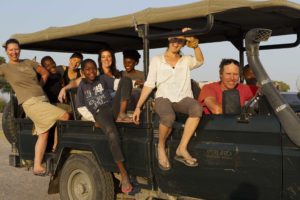
OTHER CONSIDERATIONS
- Wi-Fi: yay or nay? Some camps do, some don’t. If it’s super-important for your kids (or you) to be online, please let us know (connections can be slow so warn them they may not be able to upload Tik Tok videos from the middle of the Okavango Delta!) Many people use this as a unique opportunity to disconnect with tech and reconnect with each other as a kind of amazing ‘digital detox’.
- Dietary requirements The food will be totally recognizable – you can even have pizza, nachos, ice-cream and hamburgers in the middle of ‘nowhere’. But if your kids have genuine allergies or just individual tastes, please let us know so we can suggest camps that can accommodate them.
- Alone time. If you and your partner want to have dinner alone or have a break from the kids, it’s important to book a camp that offers child-minding services (not many do). Once again, this is something we can help you with.
- Variety is the spice of life. It’s good to have a mix of activities where possible so let us suggest an itinerary that includes fun options like quad biking (ATVs) and meerkat interactions, fishing, cultural interactions or child-specific activities like campfire cooking, so that your days aren’t all spent on a vehicle.
- Young Explorers. If your kids love nature and the outdoors, you can really be ‘Parent of the Year’ by booking a lodge that offers a ‘junior ranger’ type programme where a special guide will lead them on nature walks and interactive activities to learn and appreciate more about wildlife and conservation.
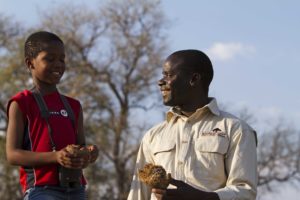
SAFETY
Like we’ve said, we’ve taken our own kids on all sorts of adventures in the bush as they’ve all lived to tell the tale! If you enjoy camping, hiking and being outdoorsy at home, then you’re already more than halfway there.
- Silence is golden. Even before you get to Africa, start talking to your children about why it’s important to be as quiet as possible on game drives, so you don’t scare the animals away. Shouting or loud crying could agitate them.
- Some guides won’t take little ones near predators. The guide’s word is Law: if she or he prefers not to get close to a pride of active lions when your children on are the vehicle, please accept that. Your safety is their main priority.
- Have ‘The Chat’. You never know what you’ll see so be prepared to talk about mating, birth, kills or carcasses in an age-appropriate way with your children. The smells, sounds and sights can be quite dramatic – though you will be surprised how children accept nature for what it is. Our tip – watch some wildlife videos prior to travel which also helps build up the anticipation!
- Don’t walk around alone. Even though camps may seem like paradise (and they are) listen to the staff about having escorts. Again – safety comes first.
- Keep your doors closed when you’re out. Remind your kids to zip up tents and close doors to keep out the creepy crawlies in particular!
- Food stays out of the bedroom. Check with the camp staff about having food in your tent – it attracts animals so rather keep what you need in the kitchen.
- Cater for your kids. This is a holiday after all, so if your children are used to an active day, make sure you visit camps with swimming pools or a variety of activities; if they like to snack, make sure you ask for some fruit/goodies to take on the game drives so they can stay out longer; if they have issues with getting up early, book a private vehicle so you can go at your own pace.
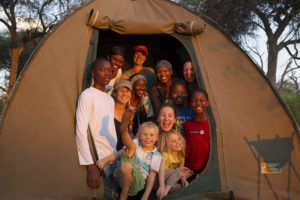
WHAT TO PACK
We can’t stress this enough: less is more on a family safari kids! Don’t get burdened with loads of paraphernalia – you probably won’t use it all anyway.
- Complimentary laundry is a life-saver. Let us book you a camp with a free overnight laundry service to cut down on the amount of clothing you have to bring along.
- Bring the colours of nature – bring your kids’ existing green, grey, khaki or brown clothes but don’t buy a whole new wardrobe. White gets dirty quickly and is too high-contrast, making it highly visible to wildlife. Black clothes make you very hot while hot pink and bright orange look a little out of place. Aim for neutrals but don’t panic about it! Just do the best you can.
- Closed shoes, sun-protection and hats are non-negotiables. We love it but the African sun can be brutal – please ensure your kids are protected against sunstroke, including regular reminders to drink lots of water.
- Africa can get cold. OK, so we’ve warned about the sun BUT safaris can also be cold, especially in the mornings and evenings. So, in addition to swimming costumes and sun lotion, bring a few hoodies, long trousers and pairs of socks for the kids.
Children love Africa, and Africa loves children. With careful planning from your consultant, you family can experience the sheer magic of safari, just as we are lucky enough to do. Speak to a Safari Specialist now to plan your family safari.
